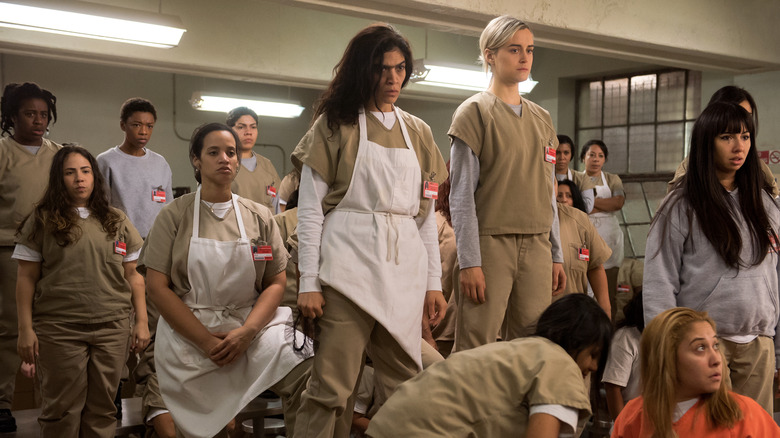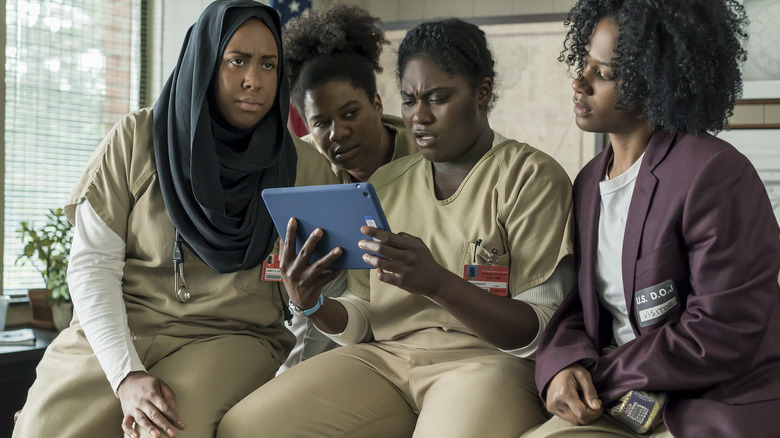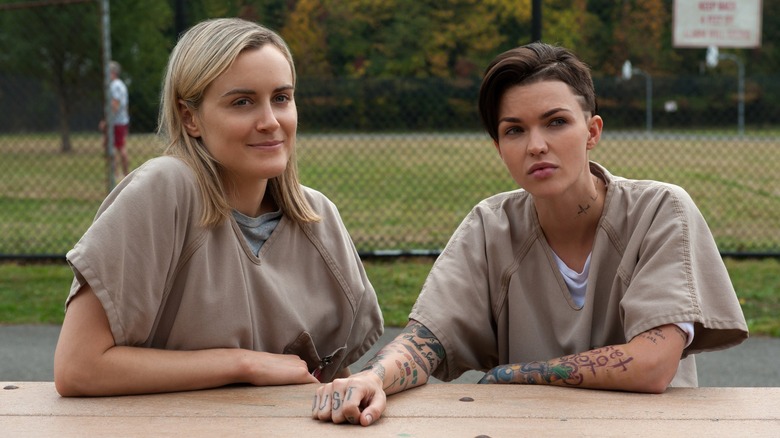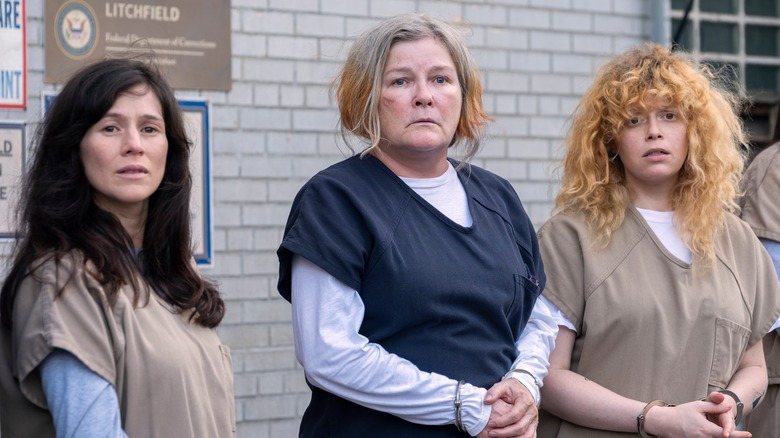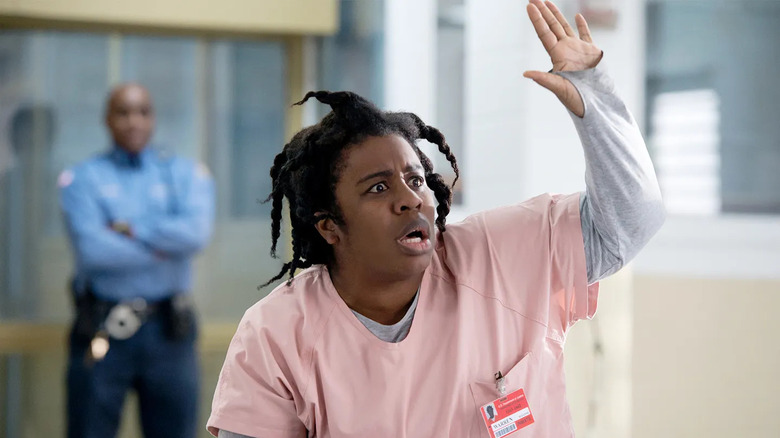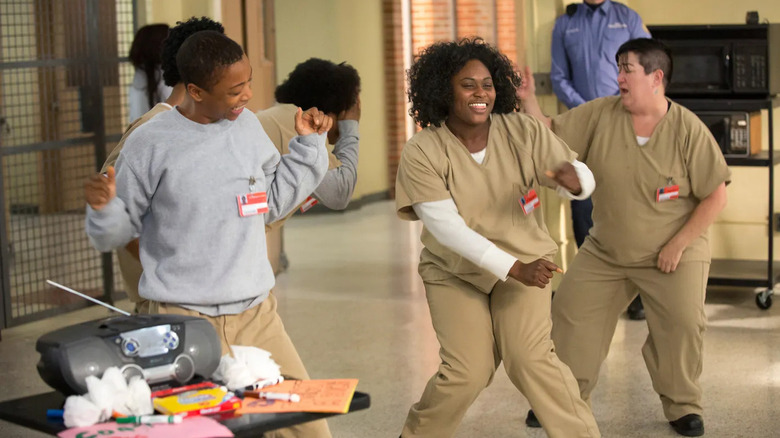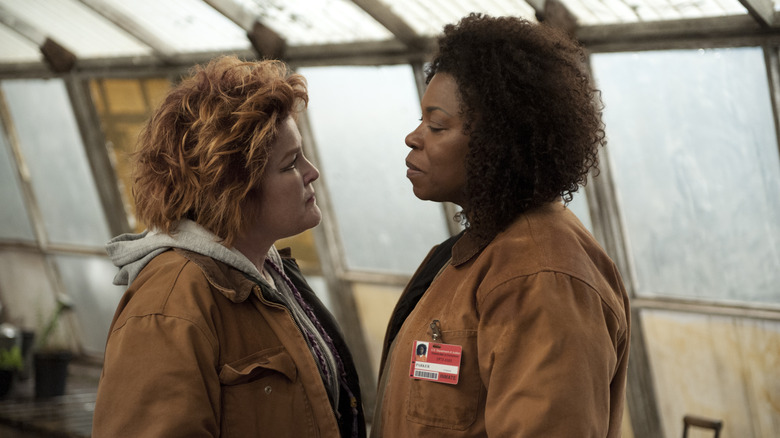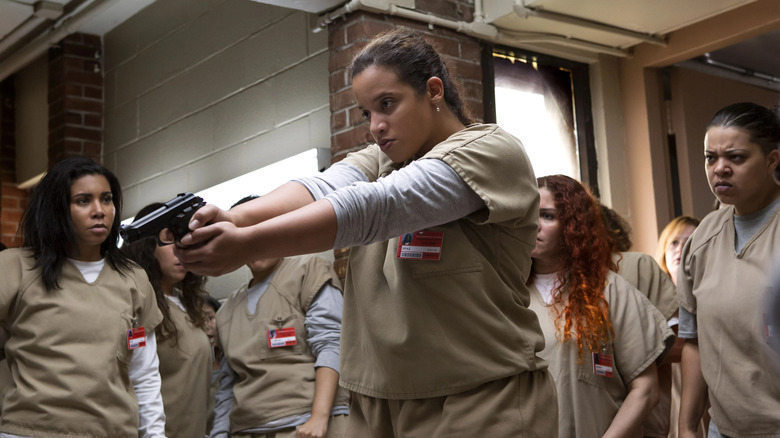Every Season Of Orange Is The New Black, Ranked
Spoilers for all of "Orange is the New Black" ahead.
"Orange is the New Black" is among the most important shows of the 2010s. It was not only one of the first series to establish the binge model as a viable release format — for better or worse — but it was also groundbreaking thanks to its diverse cast and the massive range of storylines it juggled at any given time. At its best, the show was riveting, funny, heartfelt, and bold. At its worst, it was still a fun time.
Most notably, few shows have ever felt so distinct from season to season. Season 1 was the fun fish-out-of-water comedy centering firmly around Piper (Taylor Schilling). Season 2 was a riveting prison drama centered largely on the Black inmates like Taystee (Danielle Brooks), Poussey (Samira Wiley), and Suzanne (Uzo Aduba). Season 3 was a surprisingly relaxed, lighthearted period, while season 4 took a brutal turn in the other direction, shifting the show from a comedy/drama to a drama/horror. Season 5 took place entirely within a single three-day riot, season 6 cut the cast in half and moved them into a maximum security prison, and season 7 let Piper explore life on the outside again.
Not all of these changes were made equal, however. So here's our ranking of every season of the show, from the ones that baffled us to the ones had us glued to the screen.
7. Season 5
Season 4 ended on an amazing cliffhanger. After thirteen episodes of increasingly vindictive behavior from the guards and rising anger from the inmates, viewers spent a year wondering how the show would follow through on all that build-up. The answer? Sort of badly. From the second the premiere begins, the vibe shift is clear: Whereas season 4 was scary and serious, season 5 immediately returns to the jokey demeanor of season 3. If you thought you were getting a mature, serious follow-up to the mature and serious season 4 finale, you were in for some real disappointment.
One of the worst parts about this is the way season 5 pulls back on the bold politics of season 4; it de-prioritized the compelling storyline of Taystee bargaining for better prison conditions, all to make room for Leanne (Emma Myles) and Angie (Julie Lake)'s "Beavis and Butthead" antics. The show loses its edge at the exact moment it needs it most, during what should be the most climactic, intense period of the entire series. The result is a TV show with a major hole in its legacy. The first four seasons all build up to this, and the final two seasons all deal with its repercussions, but the big event itself is the weakest collection of episodes in the series.
On the bright side, there are still plenty of good moments here, including some character-defining arcs for oft-ignored inmates like Soso (Kimiko Glenn) and Frieda (Dale Soules). Most importantly, the show at least remembers to make sure there are some legitimate consequences to the season's events, with the cast being split up and permanently sent to different prisons. As messy and disappointing as season 5 was, at least it still sent the show into a fresh, interesting direction for season 6.
6. Season 3
It's hard to judge season 3 too harshly, because it is very much a transitional season. After season 2 focused on the compelling villain Vee (Lorraine Toussaint), most of season 3 presents Litchfield Penitentiary as a calm, harmonious place. For the first eight or nine episodes, important plot points do happen, but this is still a season about hanging out and having fun. Fans complained at the time that there weren't enough changes to the status quo, but looking back, we wish we could return to that status quo a little longer. Suzanne in particular goes through so much trauma in the next two seasons, so it's fun to return to a time where her biggest problem was her erotica stories getting too popular.
The good news is that when season 3 starts picking up steam, it never lets up. The final episodes make a compelling case against the terrors of for-profit prisons, and takes characters like Sophia (Laverne Cox) and Pennsatucky (Taryn Manning) into some of their darkest places yet. There were also some storylines that initially felt like major missteps before being redeemed in season 4 when it turned out the writers had a good plan for them after all. Piper's whole pantie-selling business, for instance, seemed terrible at the time, but once season 4 established that this was an intentional low point for the character, rather than just the writers' growing disinterest in writing for her, it's become a lot easier to appreciate.
5. Season 7
Season 7 deserves props for being bold and exciting. The choice to follow Piper (and Sophia and Adrienne C. Moore's Cindy) outside of prison makes for a welcome change to the format, letting the show shine an extra light on yet another messed-up feature of the prison-industrial complex. The season serves as an extended epilogue for a lot of characters, as well as giving us some fun follow-ups to the characters the show abandoned after the riot in season 5.
The downside of season 7 is that it might be a little too depressing, even for a prison series. Some of the tragic moments, like the sudden death of Lorna (Yael Stone)'s baby, don't even have anything to do with the prison system, and instead feel like the show piling on just to pile on. The other issue is that the show's political messaging has, by this point, truly overtaken the natural character arcs for a lot of the cast. The ICE storyline has a lot of sharp commentary, for instance, but it often feels like the show's changing the characters to fit the message, rather than let the characters drive the story organically.
Still, season 7 is a solid finale. It doesn't undermine anything before it, nor does it try too hard to subvert expectations. It also makes the show's wisest decision of kicking out the widely-despised character Madison "Badison" Murphy (Amanda Fuller), and doing it as quickly as possible too. That one choice alone makes up for all of season 7's weaker areas.
4. Season 6
This season gets off to a thrilling (if jarring) start: We're suddenly stuck with a much smaller cast who've all been thrown into maximum security prison, without any idea of just how many years the riot has added to their sentencing. The first few episodes are as scary as the back half of season 4, but as we get used to life in maximum security prison, things start to mellow out. Suzanne and Pennsatucky finally get some peace, Piper gets to be fun again with her plan to bring back kickball, and Fig (Alysia Reiner) and Caputo (Nick Sandow) finally become the problematic power couple we've always wanted them to be.
Most exciting is the introduction of Barbara (Mackenzie Phillips) and Carol (Henny Russell), two new villains who are way more delightful to watch than the psychotic guards of the previous three seasons. The result is a season that doesn't have a whole lot of meaningful things to say with its social commentary, but is also more fun than the show's been in a while.
Season 6's main downfall, however, is with its Taystee storyline. Even though Taystee is easily the most interesting character on the series by this point, and has been since at least season 4, the show still treats her as one minor character in a sea full of them. The moment where she's sentenced to life in prison is devastating, but it could've been so much more impactful if the show hadn't kept her on the sidelines for so long.
3. Season 1
"OITNB" got off to a great start, expertly using Piper as a Trojan Horse to explore a massive, diverse cast of amazing characters. A lot of them come off as caricatures in the beginning, but that's only because we're seeing them from Piper's scared, sheltered point of view. As the season continues, they all become increasingly fleshed-out, and increasingly fascinating. What's often ignored, however, is that Piper is also compelling here. It's fun to watch her lose her naïveté, to see her grow apart from Larry (Jason Biggs) and closer to Alex (Laura Prepon) in an organic, nuanced way.
One could argue that an issue with season 1 is that so many major characters have to wait until season 2 for their big flashback episode. The result is that characters like Suzanne and Pennsatucky come across a little too cartoonish for their own good. Pennsatucky in particular really grates here; it makes it extra satisfying when Piper finally beats her up in the finale, but it makes some of the episodes in the latter half a bit of a drag. But much like how later events redeemed a lot of the questionable storylines in season 3, the incredible redemption arc the show gives Pennsatucky makes her season 1 arc more impressive. How could we come to so fiercely love a character who was this obnoxious when we first met her? Only "OINTB" could pull off such a feat.
2. Season 2
If season 2 had a flaw, it's that there's a little too much of Larry. He felt important in season 1 because he and Piper were still dating, but by season 2, it was hard not to wonder just why we were still expected to care. Outside of the furlough episode, every time the show cut to Larry felt like a moment wasted, as everything else going on in the show was so much more compelling.
Aside from that, season 2 is pretty much perfect. This is when the flashback structure of the series was at its most effective, giving "Lost" a run for its money with some absolute standout episodes around characters like Taystee, Suzanne, Poussey, and Rosa (Barbara Rosenblat). Lorna's episode in particular was one of the coolest things the series ever did, giving us a shocking, character-redefining twist two seasons in the making. It's also the season with perhaps the best villain: Vee is terrifying, yet it's fun to watch her slowly take over the prison, and even more fun to watch as the prison finally starts fighting back.
Most importantly, season 2 establishes that this is a show about so much more than Piper's journey, proving it could easily survive even if Piper suddenly vanished off the face of the Earth. It's specifically the Black women who run the show here, working through some of the most compelling, hard-hitting material TV has to offer.
1. Season 4
There's something about a fourth season that's had so many TV shows — "Parks and Rec," "Shameless," "Agents of Shield" — suddenly firing on all cylinders, and "OINTB" is no exception. Whereas every other season has at least 1-2 storylines that don't quite work, season 4 is when every single character is going through their most compelling journey in the entire show. Except it's happening all at once, and the pressure is ramping up further and further, culminating in one of the most cathartic and compelling final scenes in the show's history. We may rationally know that nothing good could come from Daya (Dascha Polanco) picking up that gun and pointing it at that sociopathic guard, but we're so fed up along with the inmates at this point that we're just happy to see the tables turn, even if it's temporary.
I don't know what I like most about season 4. There's the way it made me care about Piper and Alex again, or how it thrust side-character Maria (Jessica Pimentel) into the spotlight and she proved herself instantly, or how it let Poussey and Soso enjoy some happiness for once before the finale snatched it away. Most of all, I like how this is when the show found the perfect balance between social commentary and natural character progression. Season 4 is the season with the most to say about the world, the show at its angriest and loudest, but it goes about it in a way that somehow only enhances everything we've loved about the characters so far. "Orange is the New Black" may have failed to follow up on season 4 as strongly as it deserved, but the season on its own is so good it makes the whole show worth watching.
